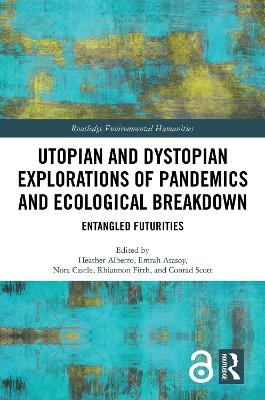
Utopian and Dystopian Explorations of Pandemics and Ecological Breakdown
Routledge (Verlag)
978-1-032-38591-4 (ISBN)
This edited collection, which is situated within the environmental humanities and environmental social sciences, brings together utopian and dystopian representations of pandemics from across literature, the arts, and social movements.
Featuring analyses of literary works, TV and film, theater, politics, and activism, the chapters in this volume home in on critical topics such as posthumanism, multispecies futures, agency, political ecology, environmental justice, and Indigenous and settler-colonial environmental relations. The book asks: how do pandemics and ecological breakdown show us the ways that humans are deeply interconnected with the more-than-human world? And what might we learn from exploring those entanglements, both within creative works and in lived reality? Brazilian, Indian, Polish, and Dutch texts feature alongside classic literary works like Defoe’s A Journal of a Plague Year (1722) and Matheson’s I Am Legend (1954), as well as broader takes on movements like global youth climate activism. These investigations are united by their thematic interests in the future of human and nonhuman relationships in the shadow of climate emergency and increasing pandemic risk, as well as in the glimmers of utopian hope they exhibit for the creation of more just futures.
This exploration of how pandemics illuminate the entangled materialities and shared vulnerabilities of all living things is an engaging and timely analysis that will appeal to environmentally minded researchers, academics, and students across various disciplines within the humanities and social sciences.
The Open Access version of this book, available at http://www.taylorfrancis.com, has been made available under a Creative Commons Attribution-Non Commercial-No Derivatives (CC-BY-NC-ND) 4.0 license.
Heather Alberro is a Senior Lecturer in Global Sustainable Development in the Department of History, Heritage and Global Cultures, Nottingham Trent University. She also serves as co-convenor for the Political Studies Association's (PSA) environmental politics specialist group and as a member of the PSA's Executive Committee. Emrah Atasoy, an Associate Professor of English, is a Marie Skłodowska-Curie Fellow (EUTOPIA-SIF COFUND) of the Institute of Advanced Study (IAS), working in the Department of English and Comparative Literary Studies at the University of Warwick, UK. Nora Castle is currently a Lecturer at the University of Bonn. She received her PhD in 2023 from the Department of English and Comparative Literary Studies, University of Warwick, UK, where she also completed an Early Career Fellowship at the Institute of Advanced Study. Rhiannon Firth is a Lecturer in Sociology of Education at IoE, UCL’s Faculty of Education and Society. She co-leads the MA modules Sociology of Education and Gender, Sexuality and Education, and is Program Leader for the MA in Sociology of Education. Conrad Scott, PhD, is an Associate Lecturer in the Department of English and Film Studies, University of Alberta, and is an Individualized Study Tutor for the University of Athabasca’s Honours English course “The Ecological Imagination,” where he holds a SSHRC Postdoctoral Fellowship.
Part 1: Monsters and Monstrosity 1. “In the woods the Tox is still wild”: The EcoGothic in Rory Power’s Wilder Girls 2. The Human/Un(human): Monster, Ecophobia, and the Posthuman Horror(scape) in Dibakar Banerjee’s “Monster,” Ghost Stories 3. A Scourge Even Worse Than Disease: Richard Matheson’s I Am Legend as Pandemic Political Allegory Part 2: Intersectional Critique 4. Fungal Imaginaries: The Reconfiguration of Post-Pandemic Society in Severance (2018) and The Last of Us (2023) 5. Five Hundred Years of Plague: Indigenous Apocalypse in Joca Reiners Terron’s Death and the Meteor (2019) 6. Corruption and Cleansing: An Eco-Feminist Approach to the Nature/Culture Dichotomy in Naomi Novik’s Uprooted 7. Through Currents of Contamination: The Failure of Immunizing Insularity in Sophie Mackintosh’s The Water Cure Part 3: More-Than-Human Mutual Aid and Eco-Justice 8. Dystopian Prohibitions and Utopian Possibilities in Edmonton, Canada, at the Onset of the COVID-19 Pandemic 9. Affiliation as Environmental Justice in Three Climate Novels 10. “A Vortex of Summons and Repulsion”: The Productive Abject, Posthumanisms, and the Weird in Charles Burns’ Black Hole (2005) 11. (Un)Caring Borders: More-than-Human Solidarities in the Białowieża Forest Part 4: Creative Resistance and Utopian Glimmers 12. “Preservation is an Action, not a State”: DIY Utopian Enclaves and Ways Out of Post-Pandemic Surveillance Capitalism in Sarah Pinsker’s A Song for a New Day 13. Pandemic Dramaturgy: Co-Designing the Performance Dying Together/Futures with the COVID-19 Virus 14. Vitality of Non-Human Entities: Plagues and Pandemics as Hyperobjects in Defoe, Camus, and Pamuk 15. World-Building Enactments of The School Strike Movements During the Pandemic: Reading Youth Climate Crisis Movements Through a Micro and Nano-Utopian Lens
| Erscheinungsdatum | 01.08.2024 |
|---|---|
| Reihe/Serie | Routledge Environmental Humanities |
| Verlagsort | London |
| Sprache | englisch |
| Maße | 156 x 234 mm |
| Gewicht | 630 g |
| Themenwelt | Geisteswissenschaften ► Sprach- / Literaturwissenschaft ► Anglistik / Amerikanistik |
| Geisteswissenschaften ► Sprach- / Literaturwissenschaft ► Literaturwissenschaft | |
| Studium ► Querschnittsbereiche ► Epidemiologie / Med. Biometrie | |
| Technik ► Umwelttechnik / Biotechnologie | |
| ISBN-10 | 1-032-38591-X / 103238591X |
| ISBN-13 | 978-1-032-38591-4 / 9781032385914 |
| Zustand | Neuware |
| Haben Sie eine Frage zum Produkt? |
aus dem Bereich


